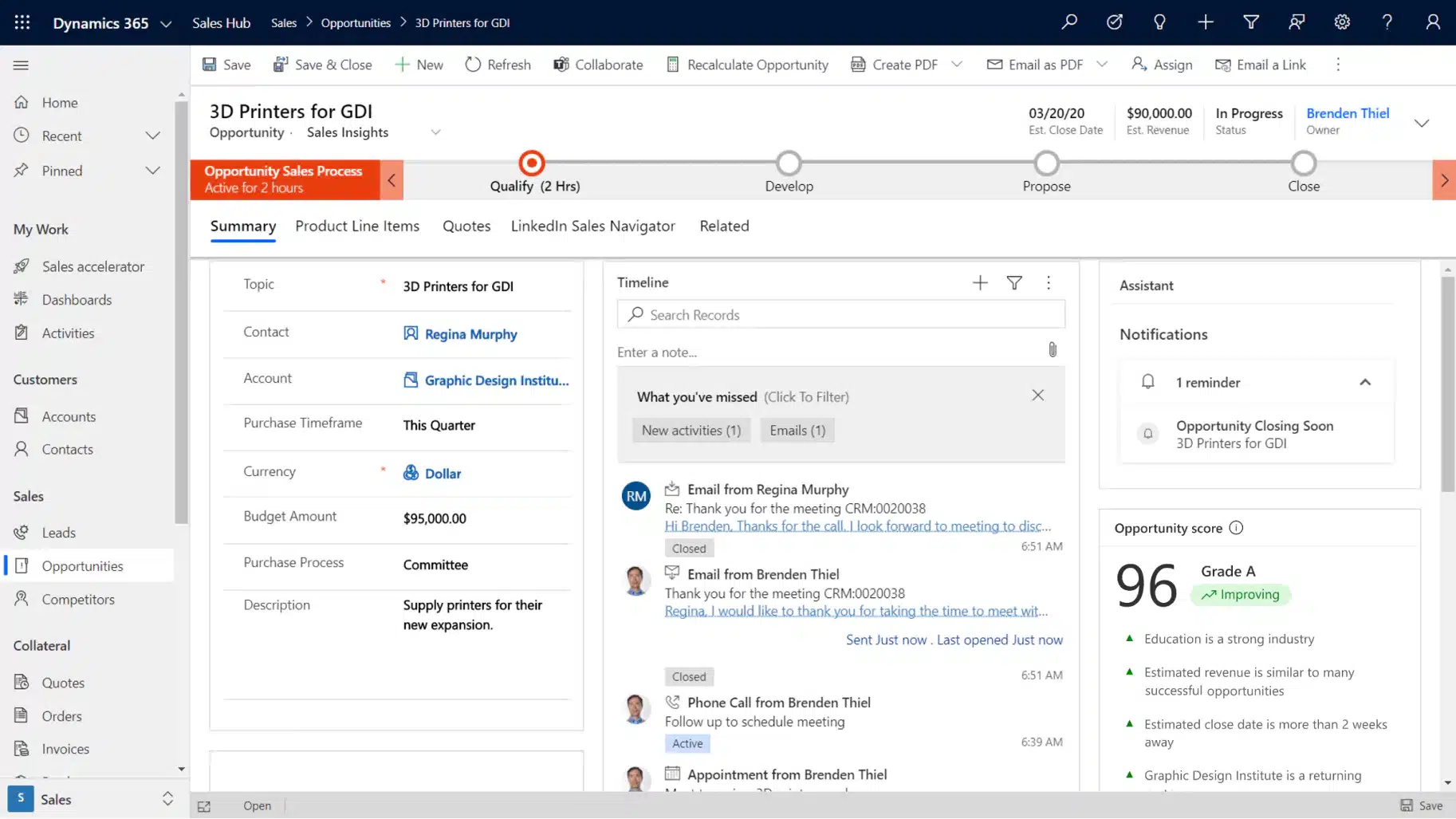Complete guide to Dynamics 365 Sales pricing

Budgeting for a customer relationship management solution like Microsoft Dynamics 365 Sales requires understanding not just the subscription fees, but also how licensing works and what additional costs to expect. Dynamics 365 Sales is a cloud-based CRM platform designed to help sales teams manage leads, opportunities, and customer relationships more efficiently. In this guide, we’ll break down what Dynamics 365 Sales is, how Microsoft licenses and prices it, what integration and implementation might cost, the total cost of ownership (TCO), and tips to get the most value from your licenses. We’ll also address frequently asked questions about Dynamics 365 Sales pricing.
What is Dynamics 365 Sales?
Dynamics 365 Sales is a CRM solution from Microsoft that helps organizations streamlined their sales process from initial lead to closed deal. With Dynamics 365 Sales, your team can track prospects and customers, manage a pipeline of opportunities, and automate routine tasks to focus on selling. The system provides a centralized database of accounts, contacts, leads, and opportunities, giving you a 360° view of customer interactions. It also offers tools for forecasting revenue, tracking performance with dashboards, and even leveraging AI for insights. In short, Dynamics 365 for Sales is a cloud-based CRM platform that keeps your sales data and activities in one place, integrates with the Microsoft 365 ecosystem, such as Outlook, Teams, Excel, etc., and helps salespeople work smarter and more collaboratively.

See Dynamics 365 Sales in action
Discover how Dynamics 365 Sales streamlines your sales processes and enhances team productivity. Schedule a personalized demo tailored to your organization’s unique sales needs.
How is Dynamics 365 Sales licensed?
Dynamics 365 Sales uses a per-user, subscription-based licensing model. Each license is assigned to a named user and cannot be shared or rotated among multiple people. If a licensed user leaves your company, their license can be reassigned to someone else, but simultaneous use by different individuals is not allowed.
Microsoft offers several subscription term options that allow you to balance flexibility and cost:
- Monthly term: This option provides the most flexibility, allowing you to adjust license counts month-to-month. It’s ideal for businesses with changing headcount or seasonal sales teams, though monthly licenses typically cost around 20% more than longer-term commitments.
- Annual term: The most common choice for small and mid-sized organizations, the annual term locks in pricing for a 12-month period. You can add users at any time during the term, but reductions or downgrades generally wait until renewal.
- Multi-year term: For businesses looking for long-term cost predictability, multi-year agreements, often spanning three years, offer fixed pricing and protection against future increases. While not as flexible, they can deliver better overall value and budget stability.
Dynamics 365 Sales offers four main license types: Sales Professional, Sales Enterprise, Sales Premium, and Microsoft Relationship Sales. Each edition provides a different level of functionality, from basic sales automation to advanced AI-driven insights and LinkedIn integration. Your licensing choice should reflect your team’s functional needs, growth plans, and desired term length.
How is Dynamics 365 Sales priced?
Microsoft Dynamics 365 Sales is primarily licensed per user as a software-as-a-service (SaaS) subscription. This means each named user who needs access to the sales application requires a license. There are four primary user license types for D365 Sales (Professional, Enterprise, Premium, and Microsoft Relationship Sales), plus a light-use license called Team Members.
- Dynamics 365 Sales Professional: $65 per user/month. D365 Sales Professional provides core sales force automation features (lead, contact, account, opportunity management), basic reporting and dashboards. It’s suited for businesses with relatively straightforward sales processes that do not require a lot of advanced customization or AI features.
- Dynamics 365 Sales Enterprise: $105 per user/month. The Enterprise edition includes everything in D365 Sales Professional plus more advanced capabilities. It’s designed for organizations with complex sales processes or larger sales teams. With D365 Sales Enterprise, you get advanced customization options, the ability to create custom applications and automated workflows, and embedded intelligence features.
- Dynamics 365 Sales Premium: $150 per user/month. D365 Sales Premium is the top-tier offering that includes all D365 Sales Enterprise features plus all the advanced intelligence and analytics tools from the Dynamics 365 Sales Insights suite. This means you get out-of-the-box AI capabilities such as advanced lead & opportunity scoring, conversation intelligence (call analysis), relationship analytics, and predictive forecasting in full capacity.
- Microsoft Relationship Sales: Variable pricing. Relationship Sales is a bundled license that combines Dynamics 365 Sales (Enterprise edition) with LinkedIn Sales Navigator, a tool for social selling and relationship management through LinkedIn. Microsoft offers this bundle for companies that want their sellers to seamlessly use LinkedIn data and outreach alongside Dynamics 365. The pricing for this is not a flat per-user number on the public price list it typically requires contacting a Microsoft partner for a quote.

Get the complete Dynamics 365 Sales pricing guide
Get a detailed breakdown of Dynamics 365 Sales pricing and licensing options. Download our comprehensive whitepaper to make informed budgeting decisions today.
Integration and implementation costs
Buying licenses for Dynamics 365 Sales is only part of the overall cost. Equally important are integration and implementation costs, initial investments made to set up and tailor the CRM system to your specific sales processes. The actual amount you’ll spend depends on how complex your sales workflows are and the extent of integrations required.
A typical Dynamics 365 Sales implementation can range from approximately $25,000 to over $250,000 for initial setup and professional services. This range covers several key implementation components:
- Solution design and system configuration: This step involves analyzing your sales processes, mapping workflows, and configuring Dynamics 365 Sales accordingly. Smaller organizations with straightforward sales cycles may rely heavily on default configurations, keeping costs relatively low. Larger enterprises, however, typically need extensive tailoring to reflect more complex sales operations, driving costs higher.
- Customization and development: While Dynamics 365 Sales includes robust out-of-the-box functionality, some organizations have unique requirements that necessitate custom development. Customization may include building specific forms, creating tailored sales workflows, or integrating with external business applications. Each of these developments increases complexity and thus cost.
- Data migration: Moving existing data into Dynamics 365 Sales, such as historical customer information, lead databases, or ongoing opportunities, is typically required. Extracting, cleaning, and importing this data can be time-consuming and resource-intensive. The costs here depend largely on data complexity and the volume of information involved.
- Training and user adoption: Successful CRM implementations rely on proper training and effective user adoption. Whether creating customized training content, hosting workshops for sales reps and managers, or investing in formal Dynamics 365 Sales courses, these training initiatives incur additional costs. A strong initial investment in training mitigates the risk of productivity loss or mistakes later on.
- Integration with other systems: Companies frequently integrate D365 Sales with other business software, such as ERP platforms, marketing automation tools, email systems, or customer service applications. Each integration has its own cost, which can vary significantly depending on complexity.
While some providers might offer less costly Dynamics 365 Sales implementations by utilizing offshore resources, these often come with hidden drawbacks. Offshore teams may not fully understand U.S. business practices, industry standards, or compliance requirements. Additionally, language and cultural barriers, along with time-zone differences, can lead to misunderstandings, project delays, and overlooked critical details.
Many businesses opting for cheaper D365 Sales implementations end up with systems that lacks critical functionality or accuracy. In some cases, deployments fail entirely, forcing companies to start over and spend significantly more on remediation. Fixing a failed implementation can easily cost double the initial investment required to get it right from the outset. Investing in a well-planned, professionally executed Dynamics 365 Sales implementation, aligned specifically with your business requirements, is ultimately more cost-effective and reliable over time.
D365 Sales Total cost of ownership (TCO)
When evaluating Dynamics 365 Sales, it’s important to consider the Total Cost of Ownership (TCO), the full scope of costs incurred over the lifetime of the software, including both initial and recurring expenses.
As a cloud-based CRM solution, Dynamics 365 Sales shifts the TCO calculation significantly compared to traditional on-premises systems. On-premises software requires substantial upfront licensing fees, expensive server hardware, additional database licenses, ongoing maintenance contracts, and periodic, costly system upgrades. These factors often make budgeting difficult, with unpredictable expenses inflating overall TCO.
Dynamics 365 Sales, in contrast, employs a subscription-based pricing model, simplifying budgeting by offering consistent, monthly per-user fees. This subscription includes infrastructure management, database services, regular updates, and maintenance within Microsoft’s cloud, thereby eliminating many traditional hidden costs and significantly reducing the internal IT burden.
By consolidating what were previously separate and variable expenses into a transparent monthly fee, Dynamics 365 Sales provides businesses with a lower, predictable, and more manageable total cost of ownership over time.

Upfront Licensing Cost
On-premises software has high upfront cost for purchasing the software
Infrastructure Investments
Requires significant investment in hardware, servers, networking, and infrastructure
SQL Server Licenses
Additional cost for SQL Server licenses for on-premises deployment
Database Maintenance
Ongoing costs for database management and updates
Annual Maintenance Fees
Annual fee for maintaining the software
Costly Upgrades
High costs and time investment for upgrading the solution
Monthly Subscription Cost
Monthly cost for the software that encompasses license subscription, upgrades, and maintenance
How to purchase Dynamics 365 Sales
Microsoft sells Dynamics 365 Sales through its extensive network of certified partners. These partners are trained and certified by Microsoft to sell, implement, and support Dynamics 365 Sales for organizations of all sizes. Purchasing through a partner offers significant advantages, including tailored guidance on licensing, flexible billing options, bundled services, and expert implementation support that Microsoft does not provide directly.
Selecting the right partner is crucial for your Dynamics 365 Sales deployment. The ideal partner not only ensures proper configuration and integration but also offers ongoing training, responsive support, and strategic guidance tailored specifically to your business needs. A knowledgeable partner can significantly improve your return on investment by reducing implementation risks, shortening timelines, and aligning the software closely with your sales processes.
Rand Group is a trusted Microsoft-certified partner with extensive experience deploying Dynamics 365 Sales. Our team delivers end-to-end support, including licensing optimization, seamless integration, comprehensive training, and strategic guidance to ensure Dynamics 365 Sales aligns perfectly with your business goals. With Rand Group, you gain a strategic ally committed to maximizing your technology investment.
Ready to explore Dynamics 365 Sales? Contact us today to get started.

Get Dynamics 365 Sales
Empower your sales team and drive business growth with Dynamics 365 Sales. Take the next step and implement Dynamics 365 Sales today.
Licensing tips and best practices
Strategic licensing can save money. Here are some recommendations:
- Assess your needs and choose the right edition: Evaluate the specific functionality your sales team needs before selecting an edition. If your requirements are straightforward, D365 Sales Professional might suffice; if advanced customizations or analytics are essential, consider starting with D365 Sales Enterprise.
- Leverage the base-and-attach model: Utilize Microsoft’s base-and-attach licensing structure when users require multiple Dynamics 365 applications. Assign the highest-priced application as the base license, then purchase additional applications as discounted attach licenses.
- Consider Team Member licenses for light users: Not all users require full Dynamics 365 Sales licenses, consider the lower-cost Team Member license for individuals needing minimal access. Be cautious and ensure these licenses are only assigned to users performing limited, lightweight tasks to remain compliant.
- Monitor license usage and adjust: Regularly review actual usage of Dynamics 365 Sales licenses and adjust your counts accordingly. Removing unused licenses promptly and planning ahead for user growth helps optimize your subscription spend.
- Stay informed on promotions or changes: Stay updated on Microsoft licensing promotions, pricing changes, or bundled offers through your partner. Proactively taking advantage of these opportunities can help secure better rates or improved functionality.
- Consult with licensing experts: Seek advice from Microsoft-certified licensing specialists or partners to avoid costly errors and compliance issues. Clarifying your licensing needs upfront ensures accurate purchases and optimal usage.
Dynamics 365 Sales pricing FAQs
Below are answers to common questions businesses ask when evaluating D365 Sales pricing:
- What’s the difference between Dynamics 365 Sales Professional and Enterprise?
D365 Sales Professional offers core CRM functionality suited to simpler sales processes. D365 Sales Enterprise provides advanced customization options, extensive analytics, and embedded AI features like Dynamics 365 Copilot. To learn more, read our blog on D365 Sales Professional vs Enterprise. - What is included in the Sales Premium license versus Sales Enterprise?
Sales Premium includes all features of Sales Enterprise, plus full access to advanced Sales Insights AI capabilities. Enterprise alone offers limited insights, while Premium delivers comprehensive AI-driven analytics and intelligence tools. - Is there a minimum number of licenses I must buy?
No minimum exists for Dynamics 365 Sales Professional, Enterprise, or Premium licenses, you can buy even a single license. However, Microsoft Relationship Sales (Sales plus LinkedIn Sales Navigator) requires a minimum purchase of 10 licenses. - Can I mix and match different Dynamics 365 Sales editions for different users?
No, you cannot combine Professional and Enterprise editions within one Dynamics 365 Sales environment. However, you can mix full licenses with Team Member licenses. - Can I try Dynamics 365 Sales before I buy?
Microsoft offers a fully functional 30-day trial of Dynamics 365 Sales, which includes all features. - Is there special pricing for non-profit or educational organizations?
Yes. Microsoft offers discounted pricing for eligible non-profit and educational institutions. Contact a Microsoft partner to learn more and confirm your eligibility.
Next steps
Understanding Dynamics 365 Sales pricing is essential to making informed business decisions. Whether you’re assessing license options, evaluating implementation costs, or considering total cost of ownership, clarity is key to achieving the best return on investment.
Rand Group is a trusted Dynamics 365 Sales partner dedicated to helping businesses implement and maximize the value of their CRM solution. Ready to take the next step and drive your sales transformation? Contact Rand Group today.




